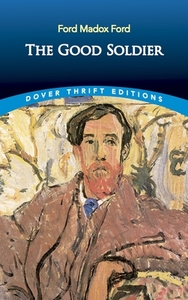Take a photo of a barcode or cover
i absolutely love this book. wow, i need to go back and re-read it.
Reading Hemingway's [b:A Moveable Feast|4631|A Moveable Feast|Ernest Hemingway|http://photo.goodreads.com/books/1327879332s/4631.jpg|2459084] brought me back to Ford, an author whose most well known piece of fiction has been on my perpetual "to read" list. Hemingway's less than flattering portrayal of Ford was the tipping point, and I finally decided to read this novel while Papa's well depicted portrait of Ford was fresh in my head.
After the first 50 pages I was convinced that I had read this story. Tropes tried-and-true seemed to drip from the pages; I found myself sighing and noting frequently how much of the book I had left. But then things changed. And the narrative took a completely different course; characters that were paint-by-number a chapter ago suddenly bloomed in unexpected ways. Ford had me on the rod for the sucker I was, and when he pulled the line, the hook set and the next 150 pages were amazing.
But there came a point in the story, and I don't want to even talk about the action of the book for fear of giving away ANYTHING - there came a point where I just wished that the book had ended. Like [b:The Sheltering Sky|243598|The Sheltering Sky|Paul Bowles|http://photo.goodreads.com/books/1173066659s/243598.jpg|2287950], I felt that I had experienced the penultimate part of the narrative somewhere way before the ending, and was shocked that there was more to read. The last 1/2 (or so) of the book isn't bad, it's just ... unfortunate additional parts of the character's stories that, while completing their lives, detracted from what I loved about the first half of the book. Had the novel ended at that "Part", and if you read - or have read - this book, you'll know of what I speak, this book would have been 5-stars without a doubt. In any event, I can still recommend it without hesitation and understand more fully why it is considered a literary classic. Despite Hemingway's comments about Ford's halitosis and annoying habits...
After the first 50 pages I was convinced that I had read this story. Tropes tried-and-true seemed to drip from the pages; I found myself sighing and noting frequently how much of the book I had left. But then things changed. And the narrative took a completely different course; characters that were paint-by-number a chapter ago suddenly bloomed in unexpected ways. Ford had me on the rod for the sucker I was, and when he pulled the line, the hook set and the next 150 pages were amazing.
But there came a point in the story, and I don't want to even talk about the action of the book for fear of giving away ANYTHING - there came a point where I just wished that the book had ended. Like [b:The Sheltering Sky|243598|The Sheltering Sky|Paul Bowles|http://photo.goodreads.com/books/1173066659s/243598.jpg|2287950], I felt that I had experienced the penultimate part of the narrative somewhere way before the ending, and was shocked that there was more to read. The last 1/2 (or so) of the book isn't bad, it's just ... unfortunate additional parts of the character's stories that, while completing their lives, detracted from what I loved about the first half of the book. Had the novel ended at that "Part", and if you read - or have read - this book, you'll know of what I speak, this book would have been 5-stars without a doubt. In any event, I can still recommend it without hesitation and understand more fully why it is considered a literary classic. Despite Hemingway's comments about Ford's halitosis and annoying habits...
It's truly a disappointment when the summary on the back of the book is of more interest and excitement than the book itself. The Good Soldier promised an insightful look into human flaws and an intriguing plot of betrayal and friendship, and in the end, it delivered very little.
The unreliable narrator is not my favorite, but when it is done well (ie Gone Girl), I can still enjoy a novel. However, that paired with a stream of conscious narration, a non-linear plot that has much in the way of backtracking and repetition, and characters that range from unlikeable to despicable...well, that is a guaranteed recipe for me to not like a book. Personally, I thought the method of storytelling was the most detrimental, for I thought the twisted relationships and plot could have been interesting if we saw any dialogue or scenes at all, or if the audience was guided more naturally though it.
I also thought that the second half of the book was much less interesting than the first. By the time you get there, much of it is just the narrator elaborating about things you've already been told, and the whole plot of Nancy was just strange and jarring to me. The rest of the characters felt at least somewhat flushed out, but the narrator's love for her, Nancy's love/hate for Edward, and her interactions with Leonora all felt very thrown together, like a fever dream. Half of the time, it felt liek it didn't even make sense, and I had to look at the Sparknotes to piece it together.
Perhaps that is what the author wanted, since the narrator is so unreliable, perhaps even mentally unwell, but in the end, it just wasn't for me.
The unreliable narrator is not my favorite, but when it is done well (ie Gone Girl), I can still enjoy a novel. However, that paired with a stream of conscious narration, a non-linear plot that has much in the way of backtracking and repetition, and characters that range from unlikeable to despicable...well, that is a guaranteed recipe for me to not like a book. Personally, I thought the method of storytelling was the most detrimental, for I thought the twisted relationships and plot could have been interesting if we saw any dialogue or scenes at all, or if the audience was guided more naturally though it.
I also thought that the second half of the book was much less interesting than the first. By the time you get there, much of it is just the narrator elaborating about things you've already been told, and the whole plot of Nancy was just strange and jarring to me. The rest of the characters felt at least somewhat flushed out, but the narrator's love for her, Nancy's love/hate for Edward, and her interactions with Leonora all felt very thrown together, like a fever dream. Half of the time, it felt liek it didn't even make sense, and I had to look at the Sparknotes to piece it together.
Perhaps that is what the author wanted, since the narrator is so unreliable, perhaps even mentally unwell, but in the end, it just wasn't for me.
Conventions and traditions I suppose work blindly but surely for the preservation of the normal type; for the extinction of proud, resolute and unusual individuals.
I’ll grant you that THE GOOD SOLDIER, by Ford Madox Ford, has one of the great first lines in all of literature (“This is the saddest story I have ever heard.”). Alas, this isn’t a sad tale at all, but it does have the sorriest narrator I’ve ever encountered in a book, much less a celebrated classic such as this one. John Dowell is weak, cuckolded, and pathetic. While celebrated for being an excellent example of an “unreliable narrator,” I just found him to be whiny and irritating.
This is a wonderful example of Modernism, and I'm glad that this was assigned in my Conrad course (as Conrad and Ford worked together on a few pieces and were friends). As promised with most modernist literature, we have a wonderful unreliable narrator that keeps weaving around the story who, clearly, doesn't know half of the stuff that he talks about. That makes it uniquely interesting to me. But of course, there is also a lot of outside-of-the-marriage courtship going on that was fun to try and unravel.
There are some wonderful moments where our narrator, John Dowell, compares America to Britain (Dowell is an American, but the Ashburnhams are British. There are also some nice snipes at the Catholics. And of course, Dowell decides that he gets to talk about women, womanhood, and femininity (even though he knows, clearly, nothing about anything). All of this makes the read fun, but keep in mind there is a lot of text to trudge through. If you like stories that come to you chronologically, this story isn't going to appeal to you. However, I think it is one of the best Modernist pieces that I have read in a long, long time.
But the real fierceness of desire, the real heat of a passion long continued and withering up the soul of a man is the craving for identity with the woman that he loves. He desires to see with the same eyes, to touch with the same sense of touch, to hear with the same ears, to lose his identity, to be enveloped, to be supported. For, whatever may be said of the relation of the sexes, there is no man who loves a woman that does not desire to come to her for the renewal of his courage, for the cutting asunder of his difficulties. And that will be the mainspring of his desire for her. We are all so afraid, we are all so alone, we all so need from the outside the assurance of our own worthiness to exist.
There are some wonderful moments where our narrator, John Dowell, compares America to Britain (Dowell is an American, but the Ashburnhams are British. There are also some nice snipes at the Catholics. And of course, Dowell decides that he gets to talk about women, womanhood, and femininity (even though he knows, clearly, nothing about anything). All of this makes the read fun, but keep in mind there is a lot of text to trudge through. If you like stories that come to you chronologically, this story isn't going to appeal to you. However, I think it is one of the best Modernist pieces that I have read in a long, long time.
When bored rich people philander.... Some lovely passages but not enough to hold my interest for long. The mark of a classic is that is relevant many years after publication and this one missed the mark.
fast-paced
A structurally fascinating book, especially for it's time, but hard to enjoy the actual story.




